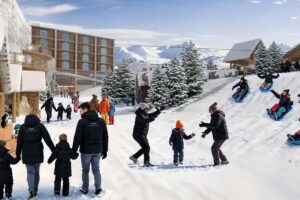Before the sun lifts its golden veil over Vanua Levu, as the matangi—a soft morning breeze—stirs the banana trees and cassava leaves, a single flame flickers before an icon of Christ. In the stillness of early dawn, a rooster crows. Coconut smoke curls like incense from an open hearth. The land and sea hold their breath. This is the rhythm of the Pacific—where time flows like a river, not a clock, and where the Church breathes with the pulse of creation itself.
Here, where the soil is rich and hearts are open, the apostolic flame finds fertile ground. The Gospel does not arrive with thunder. It comes like the rain—gentle, steady, life-giving. Carried not by force, but by vaka—sacred canoes of grace—rowed in rhythm with prayer. Those who serve do not come to change the people. They come to listen, to receive, and to join the sacred song that is already being sung.
On the Feast of the Holy Apostles Peter and Paul, the Church lifts her gaze not only backward in history, but outward across oceans. From Galilee to the green valleys of Fiji, their witness continues. Their names are not relics; they are torches. Their footprints are still felt in the sugarcane fields and along the coral-fringed shores of the Pacific.
Fr Michael Psaromatis, parish priest of St Dimitrios Greek Orthodox Church in Salisbury, South Australia, has been crossing these waters for over a decade. For eleven years, he has served the Orthodox Mission in the South Pacific with the steady devotion of a sower of seeds. In June 2025, he returned once again to Fiji, joined by a group of faithful from Adelaide: Amphilochios, Iliana, Anastasia, Polytimi, Carlos, and little Claudia. This journey was not a project—it was a pilgrimage. A prayer wrapped in service, sealed with tears.
They arrived as the Church was preparing to commemorate Saints Peter and Paul—two men as different as night and day, yet united by divine fire. Peter, the Galilean fisherman, who walked on water and sank, who denied and was restored. Paul, the scholar of Tarsus, who persecuted and then preached, who was blinded and saw more clearly than ever. Men remade by the Resurrection. Their witness lives on—wherever Christ is preached and wherever love proves stronger than fear.
With the blessing of His Eminence Metropolitan Myron of New Zealand and the encouragement of Archbishop Makarios of Australia, the team journeyed from Saweni to Labasa, from Koroipita to Savusavu. They brought not only rice, flour, and oil, but also reverence, patience, and joy. Over 100 family care packages were prepared and distributed. More than 120 kilograms of hygiene and first aid supplies were carried from Adelaide. An additional 300 kilograms of food and essentials were purchased locally through donated funds. But what they offered transcended quantity—these were not simply donations, but sacraments of mercy.
In homes of woven bamboo and rusted tin, where the rain taps like monastic chanting on the roof, the team encountered people whose hearts were domed with heaven. In one village unreachable by sealed road, a family of 30 Orthodox Christians greeted them with tears—not of sorrow, but of joy. Their floor became a sanctuary. Their tears became prayer.
Each team member offered something precious. Amphilochios, once a child at St Tabitha’s Orphanage, returned as a young man and theology student at St Andrew’s College in Sydney. His voice, shaped by the Church’s hymns, rose above the valleys with grace. Iliana and Anastasia brought quiet strength, spreading encouragement and peace. Polytimi and Carlos prepared and served meals with love. Little Claudia brought joy to children her age, playing with them as if they’d always known each other. Together, they moved as one body—guided by the breath of the Spirit.
Fr Michael, long a familiar presence among the Fijian faithful, returned not as a visitor, but as a father among his children. His embrace carried memory. His voice, love. In one remote village—Savudrodro—that love found him in an unexpected way.
As he spoke with a local woman in search of the only Orthodox family in the area, a voice suddenly rang out across the green hills:
“Fr Michael! Fr Michael!”
A young boy came running barefoot down the slope, voice cracking with joy, tears in his eyes. It was Phanourios, once a child in the Saweni orphanage. Fr Michael had known him since he was small. Neither expected the other. But the Lord, in His quiet providence, had arranged their meeting.
Phanourios ran straight into his arms. They wept. They laughed. Villagers stood in reverent silence. It was not merely a reunion—it was a divine embrace. A moment of grace in a village with no church, where a child once sheltered by the Church now stood as a bearer of its memory. In that embrace, the Church was made whole.
The mission continued. Agiasmos was offered, and homes were blessed. In Nabavatu, Urata, Tabia, and Seaqaqa, prayers were spoken and practical needs met. In Labasa, at the parish of Saints Athanasios and Nicholas, the team were welcomed with warm hospitality. Matins, Holy Unction, and Divine Liturgy were served for the Feast of St Samson the Innkeeper. In these humble services, healing came, the Spirit descended, and Christ was revealed.
There, Fr Alexios Nand and Presvytera Sevastia serve with tireless devotion. Fr Alexios drives long distances weekly to reach the faithful. He celebrates the Divine Liturgy, visits the sick, teaches the young, and restores dignity to the forgotten. His ministry is unseen by the world—but known in heaven.
By his side stands Presvytera Maria, widow of the late Fr Barnabas, the pioneering priest of Orthodoxy in Vanua Levu. She remains a gentle pillar—wise, beloved, steadfast. Through her, the Church remembers—and breathes.
In Saweni, the group met Fr Timothy Triantafyllou, newly ordained under the Holy Metropolis of New Zealand. Together with Presvytera Dimitra and their children, Alexios and George, they serve the Orthodox in western Fiji with contagious joy and unwavering commitment. Their presence proves the mission is not passing through—but planting roots.
In Koroipita, they witnessed lives restored through faith and dignity. Here, displaced families found not only homes, but hope. Echoes of St Peter’s words rang out: “Once you were not a people, but now you are the people of God.”
One evening, the team returned to St Tabitha’s Orphanage. Beneath the stars, after a lovingly prepared meal, the children sang traditional Fijian songs and offered dances of thanksgiving. These were not performances, but liturgies of the heart. In Fijian culture, gratitude is danced as much as it is spoken. The Psalmist’s words came alive: “Let everything that has breath praise the Lord.”
Though the journey ended in the quiet fields of Vanua Levu, its echo remains. The team returned to Adelaide not with achievements, but with memories. They carried back the rhythm of rain on tin roofs, the fragrance of coconut smoke and incense, the laughter of children and the silent tears of widows. They carried the hush of prayer in mountain homes, and the sound of “Kyrie Eleison” and “Our Father” whispered in another tongue.
The Orthodox Mission in Fiji is not an event. It is a living presence. It grows with every whispered prayer under a palm tree, every lamp lit before an icon, every meal shared in silence, and every tear met with love.
And perhaps—in the mystery of Christ—it is also only the beginning.
For the vaka still waits in the water. The matangi still stirs the dawn. The hills still echo with the names of saints, and the earth still thirsts for blessing. There are still children looking to the Church with hope, homes to be visited, wounds to be healed, and songs yet to be sung beneath the Southern Cross.
This is not the end of a mission. It is a page in a Gospel still being written—with salt and light, with footsteps and flame, with cassava shared and names remembered in heaven.
The Kingdom of God has no borders. The Pacific is not far. The islands are not forgotten.
Christ has walked among them.
And He will return—again and again—in every act of mercy, in every liturgy beneath the breadfruit tree, in every tear embraced by love.
For where two or three gather in His Name—on coral shores or mountain paths—there He is also.
And the Church, like the ocean, will continue to rise.
— By the Orthodox Mission in the South Pacific












